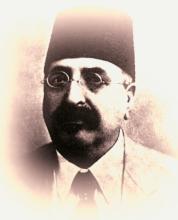His obituary appeared on page 8 of Hong Kong Daily Press, 1935-08-16:
OBITUARY
Mr. H.M.H. Nemazee
News has just been received (by cable) from Shiraz, Persia of the death of Mr. H.M.H. Memazee [sic] at the age of 78 years.
The late Mr. Nemazee was the principal of Messrs. Nemazee and Sons which owns a large fleet of steamers.
Born in 1857 at Shiraz, the deceased gentleman came out to Hong Kong in 1890 and remained here for almost 40 years. He retired from active business life in 1922 and returned to his native place. He returned to Hong Kong on two occasions in 1927 and 1932.
Deceased was a well-known philanthropist and had contributed large sums to various charities. He was a member of the Court of the University of Hong Kong and a Justice of the Peace.
Deceased is survived by two sons M. Nemazee of Hong Kong and A. Nemazee of Shanghai.
He is also mentioned in Extraterritoriality, Nationality, and Empire in the Persianate World, 1890-1940:
For the British, the most high-profile nationality case turned out to be that of Haji Muhammad Hasan Namazi. Namazi was born in Shiraz in 1859 to a mercantile family with business in Hong Kong.112 He too became a successful merchant and ship-owner and led the maritime trade of Chinese green tea to Russia via the Black Sea. He lived in Bombay for twelve years before settling for the next thirty in Hong Kong, where he owned considerable commercial real estate and named his racehorses after Iranian mountains. In 1916, he became a naturalized British subject in Hong Kong and was appointed Justice of the Peace in 1921 as a gesture toward the colony’s Indian inhabitants. The governor, R.E. Stubbs, explained: “Mr. Nemazee, though of Persian birth, is so closely associated with the Indian community that I think that most people in the Colony would be surprised to learn that he is not an Indian.”113 Stubbs also praised Namazi’s philanthropic work, especially his gift of HK$100,000 to the University of Hong Kong. In 1923, when Namazi and his son, Ahmad, who was born a British subject in Hong Kong in 1901, entered Iran from Iraq near Khanaqin, Persian authorities confiscated their British passports, asserting both men to be Iranians.114
British officials would have let the matter drop had it not been for the fact that they alleged Namazi to be the principal opium smuggler between the Persian Gulf and China. They were determined to destroy his operations, but this task would prove easier said than done. British opium laws varied from colony to colony, and the Namazis navigated them artfully. Hoping to close these loopholes, the British government made it illegal for Hong Kong residents to trade opium without a license in 1924.115 In April 1925, Sir Percy Loraine, the minister to Iran, met with Namazi in Shiraz, where he had recently opened a maternity hospital. His most famous son, Hajj Muhammad, who was born in Hong Kong in 1896, would carry on this charitable tradition, founding the Namazi Hospital in Shiraz after World War II.116 Loraine warned Namazi senior that Britain was seeking to prosecute him but knew that his status as a Persian national would protect him in Iran, remarking that “my threat was a ‘brutum fulmen’ which Nemazi may be sharp-witted enough to detect.”117 The following year, an interdepartmental committee in London drafted the “The Dangerous Drugs Regulations” (1926), prohibiting British subjects from dealing in Iranian opium without a license within the extraterritorial jurisdiction of the consular courts in the Persian Gulf.118 Namazi was careful not to break the new opium laws. His eldest son, Aqa ʿAli, had reportedly shifted the family’s narcotics business to Bombay, which enjoyed laxer opium laws than did Hong Kong or Bushihr. In the spring of 1926, Namazi left Bushihr on his Persian passport for Hong Kong via Bombay, and the British consul-general was obliged to visa this document as he could not deny a British subject entry into British territories.119 Namazi returned again to Shiraz several years later, where he died in 1935.
